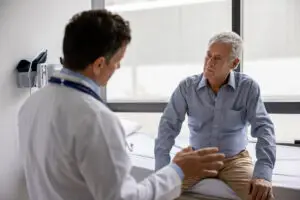Thank you to everyone who participated and submitted questions during our recent Coffee Corner Chat, where our Clinical Team of oncology nurse practitioners answered patients’ questions live in the Outcomes4Me Coffee Corner Community channel. Below, you’ll find a full recap of the questions and answers that came from the event.
Q: After a year of Chemo should you still have the taste of the medicine in your mouth from time to time?
A: Hello and thank you for sharing a question! Taste alteration from chemotherapy is real. It may occur during or after chemotherapy treatment. Taste alteration can come in different forms such as a metallic or chemical taste in your mouth, foods may taste the same, bland and/or different from before. The cause of taste alteration may be from certain chemotherapy agents, such as Cisplatin, Cyclophosphamide, Doxorubicin, Paclitaxel, as well as some immunotherapy drugs and even some pain medications and antibiotics.Taste alteration may also occur due to changes in oral mucosa such as dry mouth or mouth sores, nausea or vomiting, and dehydration. It may take up to 3-4 weeks after treatment is completed for taste alteration to subside, but keep in mind everyone is different. For ways to manage taste alteration here are the recommendations from cancer.net.
Q: Should a woman with an estrogen positive breast cancer diagnosis limit foods such as soy, almonds, chia seeds, etc.?
A: This is such a great question and so happy you asked. There is a great article from the American Institute of Cancer Research (AICR) by their Nutrition Advisor called “Soy and Cancer: Myths and Misconceptions.”Some great takeaways from this article are:
- Isoflavones are the natural plant compounds found in soy foods and although they have a similar chemical structure to human estrogen, they function differently.
- “Consistent findings from several population studies demonstrate that there is no increased risk for breast cancer survivors who consume soy foods. In fact, limited evidence shows potential for greater overall survival, and perhaps decreased recurrence, among women (including those who had ER+ cancer) who include moderate amounts of soy.”
Q: Why did no one tell me about all the possible long-term effects of radiation treatment? I admit, if I had known, I might not have had surgery or radiation… but that is no reason to downplay side effects.
A: I am sorry that you were not well informed about the possible side effects of radiation treatment. If you want to share more about your experience, we are here to help. You may also send in a question to me via the Ask Outcomes4Me feature in the app.
Q: If you don’t have a strong family history of BC or other known factors, do you recommend genetic testing?
A: If you have a personal history of breast cancer, the National Comprehensive Cancer Network® (NCCN) provides guidelines for genetic testing. I am not listing every indication here but will review a few examples. Genetic testing per NCCN Guidelines® is indicated if you are under age 50, or at any age for a diagnosis of triple negative breast cancer, or multiple primary breast cancers. Genetic testing is also indicated at any age if you have a family history of breast, ovarian, pancreatic, prostate cancer. The Outcomes4Me app also has a way to check if you are eligible for genetic testing. You may navigate to this by tapping on “SEE MORE STEPS” from the home screen and then tapping on “check eligibility” under the “Do you need genetic testing?” section. If you are interested in genetic testing, but do not have a strong family history of breast cancer or other cancers, you may want to consider genetic counseling first and a great resource is the National Society of Genetic Counselors.
Q: Who should request a MRI scan? I have dense breasts, ILC lumpectomy 1.5 yrs ago. Stage 1, no nodes. Oncotype17. In the DEBRA trial, no radiation. Had follow up MRI, mammogram suspected contralateral malignancy but stereotactic biopsy negative. Have a mammogram in 6 months but wondering if MRI is better or not?
A: Hello and thank you for posting this question. I believe that by MBI you mean MRI. The NCCN Guidelines® offer some direction on breast MRI and state that “The utility of MRI in follow-up screening of patients with prior breast cancer is undefined.” As well, MRI should generally be considered for patients with dense breasts treated with Breast conservation surgery and radiation therapy and for individuals who are diagnosed before the age of 50. There are other reasons why your oncology care team may order a breast MRI and some (not all) examples may be for staging evaluation, so that your care team is able to define the extent of your cancer or if there are multiple tumors in the same breast, or to screen the other breast (also called contralateral) at the time of diagnosis to name a few.
Q: How do I know if my cancer comes back in a different place in my body?
A: This is a great question and I wish there were an easy answer! After you are diagnosed with breast cancer, and complete the treatment, you should continue to follow up with your medical oncology team (possibly breast surgeon and radiation oncology team for a period of time too) for a history and physical (H&P) exam. The recommendation is that you do this up to 4 times a year for 5 years after completion of treatment. For example, you may see your oncology team every 2-3 months for the first year, and then shift to every 4 months after that. It isn’t set in stone, and really it is important that you discuss the timing of your follow up with your provider and feel good with the plan. If you are on endocrine therapy, for example, you may continue this beyond 5 years, depending on how long that treatment is recommended for. You will continue with recommended breast imaging as well. In the first 1-2 years, you may also alternate between providers, if you continue to see your surgeon, and radiation oncologist instead of seeing all of them at the same time. It is at these visits that you will be examined and hopefully, receive reassurance that you do not have any signs of cancer recurrence based on your exam. If you are having concerning symptoms, you should report them at any time, especially at the time of your H&P. This will allow for your provider to arrange any necessary tests to evaluate you further. Symptoms can be very different for each person and may be unrelated to a spread of the cancer, but a sign of another illness. Some of these symptoms include, back, bone, or joint pain that does not go away difficulty urinating, numbness or weakness anywhere in your body, a constant dry cough, shortness of breath or difficulty breathing, chest pain, loss of appetite, abdominal bloating, pain, or tenderness, constant nausea, vomiting, or weight loss, jaundice (a yellow discoloration of the skin or whites of your eyes), severe headaches, vision problems, seizures, loss of balance or confusion (Source).
Q: Half of my family has died of cancer. I have a cyst in my breast. Can this turn into cancer?
A: First of all, I am so sorry to hear about the loss of your family members from cancer. Thank you for sharing it here. Sharing our story takes a lot of courage and may give someone else the courage to share their story.
Breast cysts are one of the most common reasons for a referral to a breast clinic. Breast cysts are part of a non-cancer disease process that is also called fibrocystic disease in the breast. I found a great article that I would like to share with you on Breast Cysts. Some highlights include: the lifetime prevalence of fibrocystic breast disease might be between 70% and 90%, fibrocystic disease by itself is not strictly a risk factor for the development of breast malignancy and proper diagnosis, treatment and management of breast cysts are essential. Complex cysts are followed more closely. The American College of Radiology provides a standardized classification system for the assessment of findings of breast imaging (BI-RADS) with six classifications representing different levels of suspicion for malignancy. I hope this information is helpful. Please feel free to ask me more questions in the Ask Outcomes4Me feature of the app.
Q: Are there specific lifestyle changes (diet, exercise, sleep, etc.) that can help minimize the chance of recurrence or improve my overall health after breast cancer?
A: Thank you for this question! Diet, lifestyle, and sleep plans should all be considered with your care team. After completion of cancer treatment, there may be some late side effects from treatment impacting what you can eat and how you are able to exercise for some people, while others may have been able to continue to exercise during treatment. It is important to discuss whether it is ok to start a new exercise routine with your surgical team and medical oncology team. As well, it is always helpful during and after treatment to discuss your diet with a Registered Dietician. The American Cancer Society recommends that adults get 150-300 minutes of moderate intensity or 75-150 minutes of vigorous intensity activity each week, follow a healthy eating pattern with foods that are high in nutrients (vegetables, fruits, whole grains, limiting processed and red meats, limiting sugar and sweetened beverages, avoiding alcohol).
Q: It has been noted that I have innumerable sclerotic bone lesions. A biopsy of the largest one showed no malignancy today. What is the usual progression of these types of lesions in terms of likelihood – do they remain stable or become malignant? It appears that the number of them has increased since a Feb scan.
A: Thank you for your question Tracie. Bone biopsies can be challenging whether it is with the acquisition of a tissue sample, or with the analysis of the tissue. It sounds like the biopsy you had was negative however from one scan to the next, there were more lesions seen on the bone. It is important to ask your oncology provider if they suspect that these are malignant or not despite a negative biopsy. Feel free to send more questions via the ASK feature from the App!
Q: I am a 59 y/o female with no know family BC history. I had a Stage 1, pea sized lumpectomy and 4 nodes removed. All margins are clear. Had Radiation therapy. My Naturopathic Physician and Radiologist support my not wanting to take Letrozole. I have Osteopenia, Anemia, Hashimotos and Pure Hypocholsteremia plus a possible undiagnosed Celiac disease. My Naturopathic Oncologist thinks i should try the Letrozole. I am plant based, no sugar or dairy. Do you have any suggestions?
A: Hello and thank you for this question. It sounds like you have been able to have good discussions with your care team around treatment decisions. If you decide to start Letrozole, it is a great idea to use the medication and symptom tracker feature in the App so that you are able to make daily notes of how you are feeling on the new medication. Letrozole can reduce bone density, and with your history of osteopenia, your provider will be monitoring you closely for any changes.
Q: Can you explain the late recurrence risk for breast cancer? What signs of recurrence should I look out for
A: This is a great question. Recurrence risk is unique to each person diagnosed with breast cancer. Recurrence risk depends upon many factors, including but not limited to cancer stage, tumor size, number of positive lymph nodes, hormone receptor status HER2 status and age at diagnosis. It is important to ask your provider what your recurrence risk is. It is also very important to follow up with your medical oncology team as indicated for a history and physical exam in addition to going for recommended imaging follow up. It is important to report to any medical provider any new symptoms of concern to you as breast cancer symptoms vary. Here are some (not all) examples of things to report: any swelling of the breast or part of the breast. Skin irritation or dimpling of the breast, nipple turning inward, nipple discharge, lump in the under arm, new or unexplained pain.
Q: After 6 years they have now decided it was time to biopsy lung nodules that have a suv of 9.4. They did a pet scan in Oct of last year and I have extensive bone mets. My question now is it even worth going, through this procedure. Kinda late horse is already out of the barn.
A: Hi, thank you for your question. The decision to undergo a biopsy is difficult. If you haven’t had a biopsy of the lung nodule, this procedure allows your oncology provider/team to gather more information about the lung nodules (malignant or not, if malignant is the histology similar to your breast cancer, the biomarker status). Tissue can also be sent off for next-generation sequencing testing, to see what other targeted treatment options there may be for you.
Q: My husband and I had plans to add to our family before this awful diagnosis happened. What should I know about fertility and pregnancy after breast cancer treatment? Is there hope we can have another baby?
A: Thank you for asking this question. Family planning is so important to discuss with your care team at any point during cancer treatment, but hopefully discussed prior to starting treatment. Please make sure your team is aware of your wishes. Depending on factors specific to each person and partner, if it is safe, and if time permits, fertility preservation may be recommended. Please discuss with both your oncology team and your OBGYN so you can make a plan together based upon your specific diagnosis and other circumstances.
Q: Breast Cancer Index, results were 3% effective with anastrozole. I have a 97% cure rate. Ive been on anastrozole for 7 years. oncologist advised me to stop anastrozole. I’m afraid. Diagnosed with HER-HR+, stage 1. Should I stop Anastrozole? Please Advise?
A: Thank you for this question. The decision to start and stop a medication is difficult. In situations like this, it is always worth considering a second opinion so that you may make the best, most informed decision.
Q: I’m going to start taking Orserdu, and I would like to know where I can learn about it.
A: That is exciting news about a new treatment option for you! Orserdu has a robust website with many resources. Check it out here: https://www.orserdu.com/
Q: Can you provide information about mental health resources, support groups, or other services for coping with anxiety or depression? I’ve never experienced feeling this way prior to my diagnosis…
A: Thank you so much for sharing this question. Mental health is such an important part of overall oncology care, and your well-being. It is important to let someone on your oncology care team know how you are feeling at any time so that you may receive the support and help you need. You may lean on family, friends, or “in real-life” groups within your community. You may want to consider the local resources available to you from your Clinical Oncology Social Worker (CSW) or Nurse Navigator. Cancer support groups may be available in person or virtually and are led by CSW’s, oncology nurses, or cancer survivors within your organization/healthcare institution. You may also want to consider one-to-one counseling with a CSW or professional counselor in your network. There are also many virtual mental health companies like BetterHelp or Talkspace. This Q&A we held with a breast cancer survivor who is also a therapist might be helpful.
Q: What are the chances of a forty-year old having cancer because I normally have pain underneath my left breast which is on and off and I feel heaviness in the left side from my neck though the arm to the back with a burning sensation in my breast?
A: Thank you for this question. The United States Preventive Services Task Force (USPSTF) recommends that women start breast cancer screening at age 40 and get screening mammograms every other year from ages 40-74. If you do not currently have a diagnosis of breast cancer and are having these symptoms, it is in your best interest to be evaluated by your primary care provider for a history and physical exam. Prior to this, if you try and think of when these symptoms started, what makes them better or worse, and if you have taken any medications for these symptoms, so that you may share this with your provider at the time of your evaluation.



